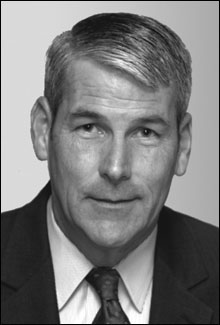
CHANGE AT THE TOP Brady
faces high expectations in succeeding Evans,
but improving the schools requires support
from the wider community. |
For someone who has been squeezed through the wringer of Providence politics, Donnie Evans, the city’s outgoing school superintendent, offers a very chipper assessment of the out-look for Rhode Island’s largest — and most consequential — school system.
“I think the district has made tremendous progress” during his three-year tenure, Evans says, particularly with a 10 percent increase in reading proficiency, as measured in standardized testing, among elementary and middle school students.
The superintendent points to a shift in the organizational culture of public education in Providence, a place where, as he notes with more than a bit of understatement, students have not always been placed first. Evans acknowledges the presence of some troubled schools, but says that many more are first-rate than widely recognized. Touting a city-state effort to accelerate progress over the next few years, he adds, “I think people are going to be very pleasantly surprised.”
The superintendent, who continues to hunt for a new job, has reason to put the best face on his time here. Yet even one of the most tangible accomplishments that he cites — the 10-point gain in reading proficiency for elementary and middle school students — underscores the depth of the problems in Providence. Although the increase seems signifi-cant, it raised the level of proficiency to just about 40 percent of those students — hardly an indicator of a successful educational system.
And while Evans’s three-year tenure is roughly the norm for a superintendent in an urban district, it also points to the unsettled nature of the top job in the Providence. Going back to the arrival of Diana Lam in the late ’90s, a series of well-compensated leaders have arrived amid acclaim and hopes of stability and long-term gains, only to depart after a few years.
In Evans’s case, his fate crumbled after the infamous December 13 snow storm, when he was unaware into the evening of how young students remained on school buses, long after they were supposed to have been transported home. (He declined comment on the reasons for his departure, other than to say that he found himself spending too much time defending himself and the district, rather than focusing on the core responsibilities of his job.)
Befitting the messiah-like way in which new superintendents are expected to single-handedly solve the complex and deep-rooted problems of urban education, Tom Brady, the former military man stepping in to replace Evans in September, happens to share a name with the superstar quarterback of the New England Patriots.
Yet delivering serious improvement in the Providence schools will obviously not be a quick fix.
If a number of Providence’s schools are indeed better than the stereotypical view from the suburbs, the cause of reform nonetheless faces immense hurdles. This is due both to the outside factors that wield a seriously disproportionate impact in the capital city — poverty, transient families, the presence of a lot of new immigrants, and so on — and the issues particular to Providence and the change-averse culture of the city’s schools.